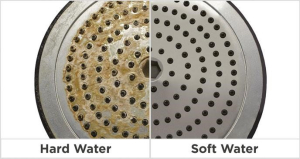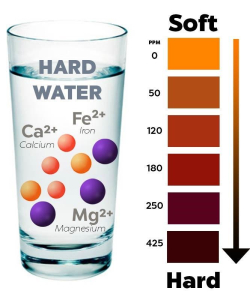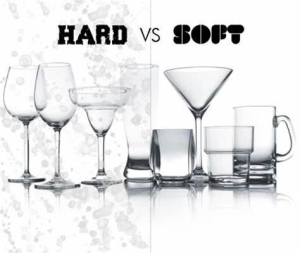Can You Drink Water From A Water Softener?
Drinking water is essential to our lives. When it comes to drinking water, we take all possible measures to ensure that we get only the safest water available. Unfortunately, hard water contains minerals that don’t get absorbed into our bodies easily. Therefore, we remove the hardness by using a high-quality water softener that can provide a regular supply of softened and safe water. There has been some debate on how safe it is to drink softened water. To clearly understand the level of safety available in hard and softened water, we need to understand the difference between the two.
Hard water contains calcium and magnesium, and other minerals. With the help of the right water softener, hard water can be softened. However, water softeners use sodium ions for the exchange process where the minerals get exchanged with the sodium ions. It could mean that there is a higher level of sodium in the softened water.
Hard water, by nature, affects the plumbing, household appliances, and kitchenware by leaving soapy scum or white spots. These minerals also accumulate in the pipes and damage the appliances that use water, such as a washing machine. Moreover, they leave the skin feeling sticky as the hard water does not remove soapiness entirely. Hard water is also not great for hair as it makes it dry. For these reasons and more, we use water softeners.


Is drinking softened water healthy?
Drinking softened water is healthy, although it depends on a few factors. It also depends on the type of water softener you use. Most people can drink softened water with no negative impact.
Soft water may taste a little different at first. If you’re used to the taste of hard water, it may take some time to get used to softened water. People with skin conditions such as eczema find significant improvement when they switch to hard water for washing.
However, people who are restricted to a low-sodium diet for health reasons may be getting more sodium from softened water. Too much sodium may not be good for babies or for those having cardiovascular issues.
Water softeners that maintain acceptable levels of calcium and magnesium in hard water are safer water treatment systems. These systems ensure that minerals in hard water are not completely removed. Fortunately, even if it did, there are alternatives that can help bring us calcium and magnesium, and other essential minerals, through our diet or supplements. It is not necessary to depend on water to give our bodies the minerals we need.

Do water softeners add sodium to drinking water?
Ion exchange salt-based water softeners replace hardness with sodium. Water softeners use a process that involves ion exchange to remove minerals like calcium and magnesium, which make the water hard.
The media in the mineral tank is charged with sodium ions to replace the hard minerals. The resin beads that trap the minerals get cleansed with sodium. How much sodium gets added to the water will depend on the hardness levels of your water.

What are the effects of drinking softened water?
It is recommended that you don’t give softened water to Infants under six weeks because of the sodium levels as their kidneys are still developing. Softened water may cause babies to get dehydrated. Also, adults under doctor’s orders to restrict their salt intake may be better off without softened water.
Other than these two health concerns, there are no known side effects to drinking softened water. It is more of a personal choice. You may prefer the taste of hard water, while others get used to the taste of softened water.
Distilled water Vs Softened water
It is very common to wonder if distilled water or softened water is better. The first step to choosing either will be to analyze the current water supply in your homes.
Decisions about improving water quality through water treatment systems must be based on the present water quality. There are three types of water – distilled water, filtered water, and softened water.
The filtration process and use vary among the three types:
Distilled water
It is considered pure and safe to drink. The water is boiled out of the contaminants making it pure and clean. However, distilled water is mainly used in machinery and batteries because it doesn’t leave any mineral buildup, even though it is safe to drink in spite of lacking some of the essential minerals.
Filtered water
Water that is filtered is safe to drink as it retains the oxygen in the water. The filtration process involves reverse osmosis. This process can be in whole-home water softeners and point-of-use systems. Filtered water is usually considered best for drinking.
Softened water
Softened water is preferred for washing and bathing, as well as for plumbing and household appliances. The filtration process used by water softeners includes replacing the hard minerals with sodium.
However, it is safe to drink, although people consider using soft water for household use such as laundry, cleaning, and appliances. It is best to recognize that the upfront cost of installing a water softener may be a tad high.

How do you make softened water drinkable?
If the hardness levels of your water are high and you want to reduce the amount of sodium intake, you may prefer to make the softened water drinkable by using a reverse-osmosis(RO) filter. It uses a purification technology with the help of a semi-permeable membrane to remove the salt and larger particles from the drinking water. You can get tasty and safe water that is free from chemicals and sodium.
Conclusion
We have considered the difference between hard and soft water and the effect either one has on our health. While the safest drinking water is when it is processed through reverse osmosis, it is safe to drink water after it has been softened through the ion exchange process. The sodium exchanged for the minerals in the resin bed does not enter the water and make it salty or unsafe.
How Ultrafil can help
If you’re in need of a water softener, Ultrafil can help! We replace, install and repair water softeners like it’s our job; wait, it actually is our job! On top of that, we do routine maintenance, performance tune up and offer emergency water softener repairs! Contact us for any more questions regarding water softeners or visit our website to learn more about everything we do!






